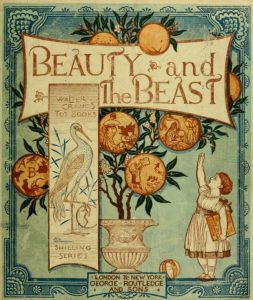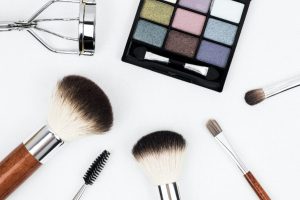In the classic fairytale Beauty and the Beast, a man is deformed by a curse he receives as a punishment for turning away an old woman based on her exterior beauty. Later, he is rescued by an act of love in the form of a kiss from Belle, who recognizes his underlying, internal beauty. The theme seems obvious: Inner beauty and virtue matter much more than out beauty, which can mask an inner ugliness.
And even though this tale dates back nearly three centuries, it still has ramifications and relevance in our modern times, and tellingly so.

Beauty and the Beast: A Modern Tale
We are a society besieged with images via television and social media. The majority of these images center around two main projections: beauty and youth.
The cosmetics industry may play a role in this phenomenon. According to Odyssey, a website focused on fostering critical conversations around important social issues: “Young girls are spending money on cosmetics more than anything else. Everyday a new product is released to make your eyelashes longer, lips fuller, skin smoother and women compete with each other to be the first one to try. The system is created so well that the more you use make-up products, the worse your skin gets so that you need to purchase various skin products to protects your skin and be able to use more make up.”
The United States seems to be particularly obsessed with makeup. Laura Mercier of the French eponymous cosmetic line has the following insight about this phenomenon, stating, “It really astonishes me the way American women wear so much makeup. French women are not flashy. They must be subtle. The message must not be, ‘I’m spending hours on my face to look beautiful.”
Beauty and the Beast and the Quest for Youth
This pursuit of the perfect look is intimately connected with a deeper psychological impulse: the need to be, or at least appear to be, young. Danielle Pender points this out in no uncertain terms in the article In 2018, Why Are We Still Obsessed With Looking Young?, warning “The narratives women are repeatedly told about getting older are full of fear, loss and irrelevance and as a result we routinely internalise that the one thing a woman should not do is age. We are so conditioned to be obsessed with youth and the promise of the new that we look at older women and demonise anyone we see as failing at the age game.”
Nor are women the only focus. Boys and men are also targeted by industry, as they exploit technology in a perpetual quest for youth. As we are bombarded continually by youth-and-beauty based images on our computers, tablets, and smartphones, the message is unmistakable: What matters most is how youthful and and beautiful you are on the outside, and men are not immune.
Speaking at Beyond Beauty in Paris, Emmanuelle Moeglin, Global Fragrance and Personal Care Analyst at Mintel, said:
The men’s grooming market has boomed in recent years as increasing amounts of men wanting to look their best look to products specifically targeted towards them to do the best job possible. To keep up with demand, the market is becoming more segmented and expanding into new categories and claims. For instance, typical feminine formats such as serum and eye cream have moved into the male category.
And if you think to push towards a gender-neutral society would stem this tide, you’d be wrong. Manny Guitterez, founder and CEO Lunar Beauty observed, “It’s all about inclusivity and encouraging people to be a little more inclusive with both men and women. I think that as time progresses and you see more men in beauty, it’ll get a little bit better and better.”
Dr. Dale Archer, an American medical doctor, board-certified psychiatrist, and radio and television personality puts it in stark economic terms: “Ads and social media portray youth as sexy, attractive, cool, and oh-so-connected. Look at any magazine, movie, video game, or TV show and it’s easy to see. In 2011 alone, Americans spent $10.4 billion on cosmetic surgery. Annually over $1.2 billion is spent on liposuction, $800 million on hair transplants and $11 billion on vitamins and supplements. And there is no greater compliment we can pay another than to say, ‘Wow! You look so much younger!’”

Essentially, we are commercializing beauty and youth, making it perhaps the most precious commodity in America. And it goes beyond advertising and marketing and reaches into the reshaping of our identities. By linking youth and beauty as a precious commodity, people are being consciously and emotionally manipulated. The essay The Commodification And Commercialization Of Youth captures this essence poignantly:
Youth as an age rather than a concept is a time to situate firmly the rules and expectations of consumer culture and our social world. Youth is a stage when these powerful rules and expectations are strongly dictated by communication disseminators such as advertising, music, movies, television, and magazines. These rules work through a consumerist ideology to serve corporations by producing meaning. These meanings that represent and signify youth have been engendered and mapped closely onto the understanding of the term “youth”. Images in advertisements are utilized to maintain these notions of youth. Their power is very pervasive in our increasingly visually based culture.
And there is a bit of a twisted reciprocal relationship going on here. Not only does consumer culture direct and influence the behaviors and attitudes of people, but people reflect that symbolic-laden mosaic of commercialism back onto each other, creating a self-affirming sociological feedback loop.
As Amy L. Best points out in her book, Handbook of Youth and Young Adulthood, “The symbolic worlds of youth are enmeshed with the currents of a commodity culture such that youth speak a lingo that is steeped with the jargon of the market. Their references, jokes, and modes of address reflect their fluency in the language of the commodity market, its bewildering hold over them, and their ability to rework that language in ways that speak as much to their realities outside the market as to those inside it.”
This relentless focus on youth is the reversal of millennia of emphasis on the veneration of elderly as bastions of wisdom. The Roman philosopher Cicero’s statement, “For there is assuredly nothing dearer to a man than wisdom, and though age takes away all else, it undoubtedly brings us that,” has been replaced by the slogan “There is nothing in this world which can match the determination and zeal of youth.”
Still, I think there is a deeper and possibly redeeming message to Beauty and the Beast. Recall that the Beast was ultimately changed through a kiss, a symbolic act of love. This points to the transformative power of love. In her article Tale As Old As Time: The Transformative Power of Love, author Mary Cintorino says that “Grimm’s tale relays the story of a young girl who sees past the Beast’s deformities, and through her love transforms him into a handsome prince.”
When we see something of deeper value in another person, despite their flaws, when we allow their emotional and spiritual core to resonate with ours, we bring the best out in that person. So, when the character Melvin Udall, played by Jack Nicholson in the movie As Good As it Gets (1997) utters the words “You make me want to be a better man,” maybe he was onto something. Being loved remakes our internal image into something that is constant and meaningful because this love can be passed on and shared with others, even as our youth and beauty fade.
So even as social media and the beauty industry work to transform the outer surface of our children, we can endeavor to transform their inner realities by showing them that love matters above all. As the fairy from Beauty and the Beast so aptly puts it, “You have chosen virtue over either wit or beauty, and deserve to find a person in whom all these qualities are united.”
At Newsweed.com, we adhere to three simple principles: truth, balance, and relatability. Our articles, podcasts, and videos strive to present content in an accurate, fair, yet compelling and timely manner. We avoid pushing personal or ideological agendas because our only agenda is creating quality content for our audience, whom we are here to serve. That is why our motto is ”Rolling with the times, straining for the truth.”
Your opinion matters. Please share your thoughts in our survey so that Newsweed can better serve you.
Charles Bukowski, the Los Angeles beat poet that captured the depravity of American urban life once said, “There is something about writing poetry that brings a man close to the cliff’s edge.” Newsweed is proud to stand in solidarity and offer you a chance to get close to the cliff’s edge with our first Power of Poetry Contest. Are you a budding bard, a versatile versifier, a rhyming regaler? Do you march to the beat of iambic pentameter, or flow like a river with free verse? If so, here’s your opportunity to put your mad poetic chops to the test. Enter our poetry contest for bragging rights and an opportunity to win some cash!






